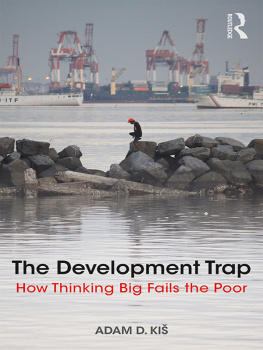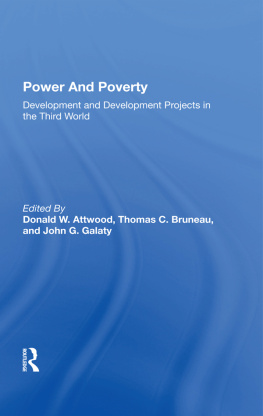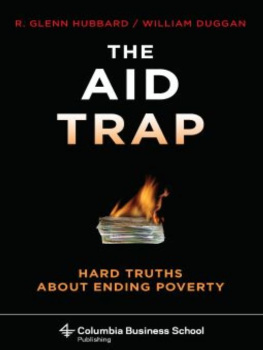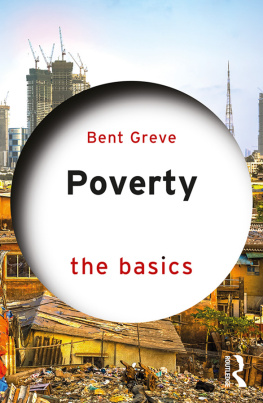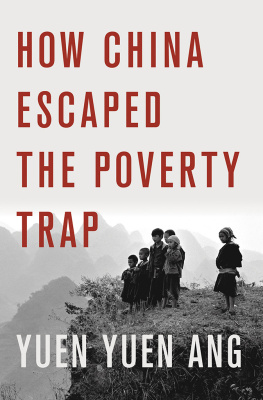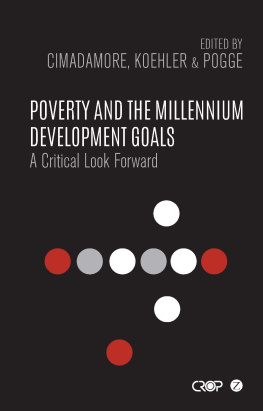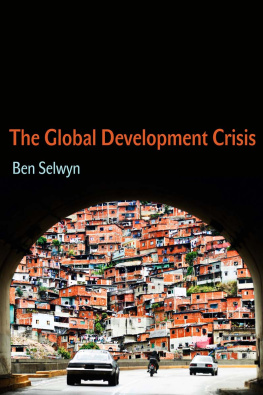Anyone thinking about a career in international development needs to read this book a dose of reality therapy about what can go wrong and how to make things go right. If program directors take the lessons of this book seriously, the results of their efforts will be less costly and more effective a win for everyone.
H. Russell Bernard, Research Professor, Arizona State University, USA
Finally, those of us who have been looking for a balanced approach to international development as a field of practice and study have a book we can confidently refer our colleagues and students to that offers a truly realistic assessment of the possibilities and challenges involved in this line of work.
ystein S. LaBianca, Professor, Andrews University, USA
This thought-provoking book offers a sound analysis of development and its misconceptions. The proposition that development has failed is hard to accept but arguments presented are undisputable. Feeling inspired to keep development uncomplicated and yet pioneering and people-focused are key takeaways for me.
Denison Grellmann, CEO, Adventist Development and Relief Agency (ADRA), New Zealand
The Development Trap is a must read for those in development work. As someone who has worked in humanitarian aid, Adam Ki brings a breath of fresh air to the question can we end poverty altogether? No donor should continue to give hand outs before reading this practical and insightful book.
Luc Sabot, former Country Director for the Adventist Development and Relief Agency (ADRA) Laos, Canada
The author has lived among the poorest of the poor in Africa and elsewhere and brings a fresh, middle ground, alternative perspective to arguments that have become increasingly polemical. This is the book to read to understand economic and social development in all its complexities, and it is clearly and engagingly written.
Edward C. Green, formerly Senior Research Scientist, Harvard University, USA
THE DEVELOPMENT TRAP
A wave of optimism is sweeping through the international aid and development industry, championed by leaders such as Jeffrey Sachs and Jim Yong Kim, who believe that poverty eradication could be within our grasp. Yet in stark opposition come those who believe that all international development intervention is hegemonic, paternalistic, and neocolonialist and must be done away with. In this book, Adam D. Ki argues for a middle ground. Poverty is an entrenched, intractable problem that will never be entirely eradicated. However, if we reorientate our objectives in line with realistic goals that improve the way that poverty is confronted on a smaller scale, we can still continue the fight for meaningful change.
Using rigorous scholarship illustrated with vivid storytelling and personal anecdotes from fighting against poverty in the field, The Development Trap argues that we need to make progress against poverty on the micro, rather than the macro scale. Instead of shooting for a single overarching end of poverty, our goals must be modest and reachable. Poverty still wont go away, on a macro scale, but it can go away for specific individuals in fact, it already happens all the time.
The Development Trap is a compelling account of the challenges of eradicating poverty, and the possibilities for meaningful change at a smaller scale. It will be perfect for international development professionals, students and scholars, and for those with a general interest in the future of aid and development.
Adam D. Ki is an Assistant Professor of Anthropology in the International Studies Program at Burman University in Canada. He holds a PhD in anthropology from the University of Florida, USA. He has lived and worked in the United States, Benin, Guinea, Sao Tome and Principe, Madagascar, the Philippines and Canada.
First published 2018
by Routledge
2 Park Square, Milton Park, Abingdon, Oxon OX14 4RN
and by Routledge
711 Third Avenue, New York, NY 10017
Routledge is an imprint of the Taylor & Francis Group, an informa business
2018 Adam D. Ki
The right of Adam D. Ki to be identified as author of this work has been asserted by him in accordance with sections 77 and 78 of the Copyright, Designs and Patents Act 1988.
All rights reserved. No part of this book may be reprinted or reproduced or utilised in any form or by any electronic, mechanical, or other means, now known or hereafter invented, including photocopying and recording, or in any information storage or retrieval system, without permission in writing from the publishers.
Trademark notice: Product or corporate names may be trademarks or registered trademarks, and are used only for identification and explanation without intent to infringe.
British Library Cataloguing in Publication Data
A catalogue record for this book is available from the British Library
Library of Congress Cataloging in Publication Data
A catalogue record for this book has been requested
ISBN: 978-1-138-57454-0 (hbk)
ISBN: 978-1-138-57456-4 (pbk)
ISBN: 978-1-351-27380-0 (ebk)
A dozen or so years ago, Jeffrey Sachs published his epic work The End of Poverty, a guide to his vision of the future where poverty would be vanquished through a significant surge in investment by the rich world through grand aid and development schemes. Sachs had been instrumental in helping to draft the UNs Millennium Development Goals several years earlier, and this book was the unveiling of his vision to the wider world. One year later, William Easterly wrote a wry rebuttal, challenging Sachs utopian vision for the future with his own assessment of what is needed to bring about significant poverty reduction: the financing of grassroots initiatives instead of top-down plans. Both Sachs work and Easterlys rebuttal (entitled The White Mans Burden) were highly influential upon me. They were published as I was finishing my doctoral dissertation in anthropology and beginning my career as a field-based development practitioner. I wanted to see who was right.
Development practitioners tend to be an extremely pragmatic lot. They usually spend less time pondering the philosophical underpinnings of development policies than they do trying to comply with them. Its not that they dont care about philosophy; its just that funds tend to flow to the most compliant agencies, so there is a strong incentive to channel ones mental energies into solving practical concerns. My colleagues were no different, and I strove for years to conform to that expectation myself. Yet other influential books continued to be published in the wake of Sachs industry-shaking work, such as Paul Colliers The Bottom Billion and Dambisa Moyos Dead Aid, which provided yet other prescriptions for the road out of poverty than either Sachs or Easterly had proposed, and this proliferation of sometimes-conflicting advice prevented me from detaching myself fully from development philosophy. Even as I learned to dutifully jump through the hoops that development funding agencies required of their implementing partners, I found myself continually drawn back to philosophical questions such as: Which prescription is right? Is there such a thing as a universally right prescription? Is poverty really defeatable? And are we drawing too much inspiration from fundamentally unachievable goals?
Looking back now upon my career as a field-based international development practitioner, I have come to the conclusion that there are two basic kinds of people working in the international development world: the cheerleaders and the critics. Cheerleaders (usually development practitioners) are those who sing the praises of the current system, idealistically believing that were almost there in eradicating worldwide poverty if only we just stay the course. Critics, on the other hand (usually development scholars), point out the many flaws they see in the current system. Almost without fail, they also put forth

